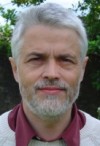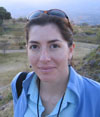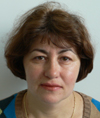D-Lib Magazine
|
James Currall
James Currall is Project Manager of the espida project. From 1994-2002 he was the manager of the User Service Team in the University Computing Service at the University of Glasgow. He was also deputy director of a UK-wide support centre for computers in the teaching of statistics (CTI). In 1997, Currall took part in putting together the University's Information Strategy framework and was subsequently made Information Strategy Co-ordinator, an area that has formed the bulk of his formal job ever since. From 1997-2000 he co-led the Effective Records Management project, which carried out fundamental research on management of organisational records in digital form. Since 2002, he has been a Senior Research Fellow of the Humanities Advanced Technology and Information Institute (HATII), where he is developing applied research into information access and more theoretical work on the nature of digital objects.
To return to James Currall's article, click (here).
Kevin L. De Vorsey
Kevin L. De Vorsey is the Systems Analyst in the Division of Anthropology of the American Museum of Natural History in New York City where he collaborates on technology projects to improve access to collection data. He is Co-Principal Investigator on a two-year project funded by the National Endowment for the Humanities to digitally image the 28,000 objects in the pacific ethnology collection and holds an MLIS degree from the Pratt Institute in New York.
To return to Kevin L. De Vorsey's article, click (here).
Lorcan Dempsey
Lorcan Dempsey is VP of Research for OCLC. He oversees the work of OCLC Research and participates in OCLC's Strategic Leadership Team. Lorcan was named OCLC Chief Strategist in March 2004. He joined OCLC in Summer 2001. Before this, Lorcan worked for the JISC (Joint Information Systems Committee), based in London, for UKOLN (University of Bath), and for a while in public libraries in his native Dublin, Ireland. He was recently elected to the Board of NISO, and writes at Lorcan Dempsey's WebLog.
To return to Lorcan Dempsey's commentary, click (here).
Christina Elson
Christina Elson (Ph.D. in Anthropology, University of Michigan, Ann Arbor, 2003) is a Curatorial Associate at the American Museum of Natural History in New York and a Mesoamerican archaeologist. Her research focuses on pre-modern states and empires, including the Zapotec of the Oaxaca Valley and the Aztec of the Basin of Mexico. In addition to fieldwork in Oaxaca, Christina conducts research on archaeology collections from sites like Teotihuacan and the Aztec town of Chiconautla that are housed at the American Museum of Natural History. One goal of this work is to re-examine these collections through the application of modern analytical techniques such as Instrumental Neutron Activation Analysis.
To return to Christina Elson's article, click (here).
Nina P. Gregorev
Nina P. Gregorev is Database Administrator and Application Developer at the Division of Anthropology at the American Museum of Natural History. She is in charge of designing, developing and maintaining the Anthropological Collection Management System, tracks interactions between the Museum and over 1,000 organizations, and records publication, conservation, and exhibition information related to the collections. She is also responsible for dissemination of the collection data through the Web based on direct access to the departmental database. Ms. Gregorev earned her M.S. in Computer Science at the Moscow Institute of Economics and Statistics.
To return to Nina Gregorev's article, click (here).
John Hansen
John Hansen is the Collections Manager in the Anthropology Division of the American Museum of Natural History. He is responsible for the physical storage and environmental monitoring of the collection. He has dealt extensively with a full range of anthropological materials and worked closely on the database representation of collections by overseeing cataloging and data entry. He earned an MA in Anthropology (Archaeology concentration) from Columbia University in New York.
To return to John Hansen's article, click (here).
Peter McKinney
Peter McKinney is Research Officer for the espida project, which is developing a sustainable business-focussed model for digital preservation (http://www.gla.ac.uk/espida). Previously, he was Coordinator of ERPANET, a key international player in the area of digital preservation (http://www.erpanet.org). As a member of HATII at the University of Glasgow, he taught in their successful digitisation summer school at various international venues and, among other things, was part of the team that developed the NINCH Guide to Good Practice in the Digital Representation & Management of Cultural Heritage Materials.
To return to Peter McKinney's article, click (here).
Paul Miller
Paul Miller, Technology Evangelist, Talis Information Ltd., joined Talis in September 2005 from the Common Information Environment (CIE), where as Director he was instrumental in scoping policy and attracting new members such as the BBC, National Library of Scotland and English Heritage to this group of UK public sector organisations. Previously, he was at UKOLN where he was active in a range of cross-domain standardisation and advocacy activities spanning Government, education, libraries, museums and archives. At Talis, Paul is active in raising awareness of new trends and possibilities, as well as working to nurture a community of developers around an emerging Library 2.0 Platform. Paul has a Ph.D. in Archaeology from the University of York in the UK.
To return to Paul Miller's opinion piece, click (here).
Norman Paskin
Norman Paskin is a consultant on standards for identification and structured management of content on digital networks, and related issues concerning management of products of the human mind. He was the first Director of the International DOI Foundation (IDF), for which his company Tertius Ltd continues to provide management services whilst also engaging in other work including with the Corporation for National Research Initiatives. Prior to setting up Tertius, he worked in scientific publishing and in information technology, and earlier obtained a Ph.D. in biochemistry.
To return to Norman Paskin's article, click (here).
Arthur Sale
Arthur Sale, Ph.D. FACS FIEAust is Professor of Computing Research at the University of Tasmania and Research Coordinator of Computing. Prior to that he was Pro Vice-Chancellor of Information Services and a University Senior Executive. Dr. Sale has been described as the 'archivangelist of Open Access in Australia' (Stevan Harnad, Canada) and a 'Living National Treasure' (John Hughes, UTS). He received the ANCAAC Award for best paper in Australia in ICT in 2001 and the ICT Industry Award for contribution to the ICT Industry in 2004. He researches in bioinformatics, mobile computing and Internet technologies.
To return to Arthur Sale's commentary, click (here).
Copyright © 2006 Corporation for National Research Initiatives
Top | Contents
Search | Author Index | Title Index | Back Issues
E-mail the Editor
doi:10.1045/april2006-authors









